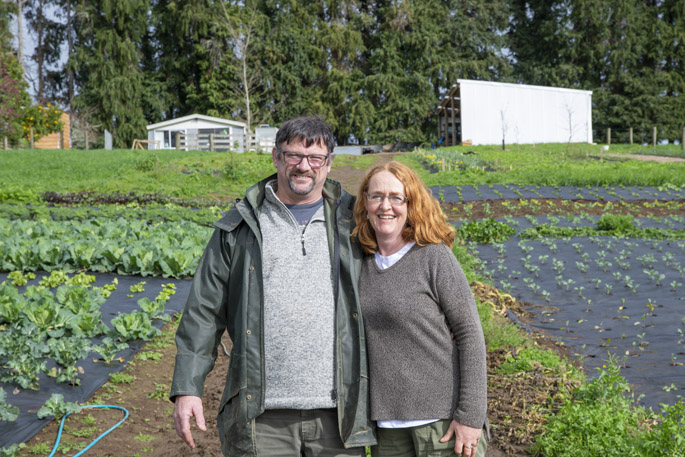Since 2002, Teresa and Philip Linehan have been producing quality sweetcorn. Initially growing on Teresa’s father’s farm, then on a four-acre block; and finally from their own eight-acre block they are on today. Last year they decided to “get serious”, and have expanded into potatoes, broccoli, lettuces, cabbages and more.
The 3.35 hectare, gently undulating Te Kawa property, offers “fantastic” maeroa ash soil.
Initially, the sweetcorn business was a way of Teresa being able to work part-time and raise their three sons, while Philip worked off the property. After a life-changing brain injury following an accident in 2003, Philip has had to work around the symptoms he will now experience for life.
The Linehans sell their produce through the Farmer’s Markets of Cambridge, Hamilton, Tauranga and Clevedon, plus Te Awamutu Twilight Produce Market in summer. Teresa was on the board of the Waikato Farmer’s Markets for some years.
“It was clear from public feedback that the demand for vegetables grown spray-free, biologically or organically, was high,” says Teresa.
With the family all grown up but still living at home, the Linehans decided to expand their business and diversify their produce lines beyond sweetcorn. Tender Fresh Produce was born.
Biological farming
While both Philip and Teresa grew up on farms, neither has a background or formal education in horticulture. And today they have years of experience in growing sweetcorn, and a huge interest and passion for growing healthy vegetables without the need for chemicals.
“We’ve always tried to use biological, natural solutions for our weeds, pests, diseases and fertilisers,” says Teresa.
She is always reading articles, and Googling for information, plus sharing knowledge with other growers. Tender Fresh Produce now grows sweetcorn, potatoes, a large selection of brassicas and green vegetables, root vegetables and much more.
The 3.35 hectares is carefully managed, using crop rotation. After each summer growing season, a couple of paddocks are retired to grass for two years, and grazed by up to 15 steers, raised from weaning until they are yearlings. They are also fed any damaged or surplus vegetables.
“We sell them on after a year before they require more grass than we have,” says Philip.
He takes care of the machinery side of things, and has a Ford 7840 tractor, and a shed full of implements for tasks such as ploughing and seed drilling. All remaining vegetable matter is put back into the soil.
For some of the vegetables, Teresa buys in eight-week-old seedlings, soaks them in seaweed solution, and plants them by hand. She uses weedmat with spaced holes for planting, having found it to be the most effective method of suppressing weeds.
For the last 10 years, the Linehans have not used pesticides. They have dealt with caterpillars on the sweetcorn, nematodes on the potatoes, slugs and snails on the greens, fungus on the cauliflowers, and more recently, rabbits. “It’s all learning through trial and error,” says Philip.
“We’ve experimented with solutions such as neem oil, natural pyrethrum and diatomaceous dust, and our neighbour shoots the rabbits.”
Companion planting
This season, with Philip’s newly-ploughed paddock ready for the first planting of the early potatoes, Teresa is looking at companion planting with marigolds. “Something that is exuded by the marigold’s roots causes nematodes to die before they can reproduce.”
Teresa is also trying mustard plants to combat the cauliflower fungal problem. The plants are harvested before flowering, and composted back into the soil to create unfavourable conditions for the fungus.
The farm is run by the family, with Teresa working full-time and Philip part-time. When more help is needed, extended family and their three now young adult sons, have always been involved, especially with the weekend markets. “The farm as it is supports the family, but that is only because we do the work.
“It’s too big a responsibility employing people and having to pay wages if we have a bad season.”
Drought and Covid-19
Last summer’s drought impacted them – with their limited, very manual watering system, unable to cope, they stopped planting in December.
The Covid-19 lockdown had less impact than the drought as there was not a lot left to sell anyway by the time the pandemic came. The couple set up a jotform for orders on their website, but delivery was time-consuming and expensive petrol-wise.
“We managed to sell some of what remained via online orders, and the steers did very well feasting on the rest.”
Their seedling deliveries were disrupted during Level 4, and there was a noticeable lag in production as nothing was coming on through the lockdown.
And so, the Linehans are “proceeding with caution”, planting at a lower level than they would have at this time of year. Teresa acknowledges that another lockdown will hit them hard, but she is hopeful that the “rules around what can and can’t be done” have been clarified, meaning the horticulture industry can act faster in changing how they sell their produce in a lockdown.



0 Comments
Leave a Comment